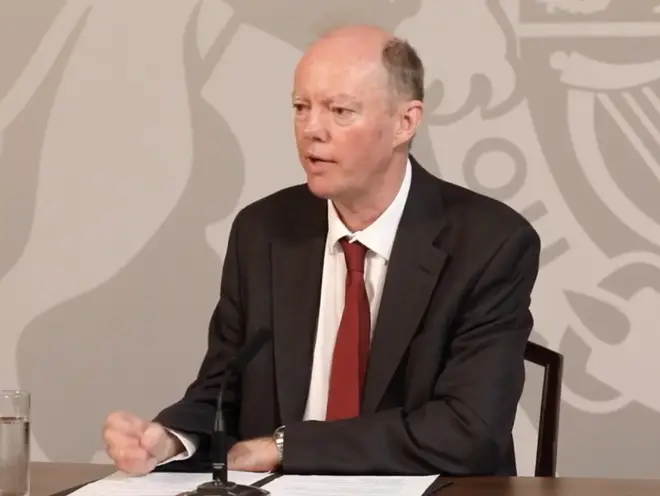
Ian Payne 4am - 7am
21 September 2020, 11:58

The chief medical officer for England has said Brits must "reduce social contacts" in a bid to slow the rise in coronavirus cases - whether at work or in social environments.
Professor Chris Whitty said people should "break unnecessary links between households" to prevent coronavirus spiralling out of control.
Speaking at a press briefing, he said: "You cannot in an epidemic just take your own risk, unfortunately you're taking a risk on behalf of everybody else. It's important that we see this as something we have to do collectively."
Coronavirus Live: Warning of rise in cases if infection rate is not halted
UK could see 50,000 Covid cases by October and 200 deaths a day by November
He said the four things to do are reducing individual risk by washing hands and using masks, quarantine measures, and investing in vaccines and drugs.
"The third one, and in many ways the most difficult, is that we have to break unnecessary links between households because that is the way in which this virus is transmitted," he said.

James O'Brien's instant reaction to Chris Whitty's speech
"And this means reducing social contacts whether they are at work, and this is where we have enormous gratitude to all the businesses for example who have worked so hard to make their environments Covid-secure to reduce the risk, and also in social environments.
"We all know we cannot do this without some significant downsides.
"This is a balance of risk between if we don't do enough the virus will take off - and at the moment that is the path we're clearly on - and if we do not change course we are going to find ourselves in a very difficult problem."
Professor Whitty said there were four ways the virus could have a "significant effect" on the nation's health if it got out of control.
Those included direct Covid-19 deaths and the risk of the NHS emergency services being "overwhelmed by a huge spike" - something that was prevented by the March lockdown.
The third way was the impact on the NHS if it had to spend "a large proportion of its effort in trying to treat Covid cases", leading to reductions in other services and indirect deaths and illnesses.

Sir Patrick Vallance warns of nearly 50,000 cases per day in mid-October
The fourth factor was the risk of economic and social impacts from coronavirus restrictions.
"Ministers making decisions - and all of society - have to walk this very difficult balance.
"If we do too little, this virus will go out of control and you will get significant numbers of increased direct and indirect deaths.
"But if we go too far the other way, then we can cause damage to the economy which can feed through to unemployment, to poverty, to deprivation - all of which have long-term health effects so we need always to keep these two sides in mind."
Speaking at the same briefing, chief scientific adviser Sir Patrick Vallance said coronavirus cases were rising across Europe - and that was leading to a mounting daily death toll.
He said in Spain and France "it started with younger people in their 20s and spread gradually to older ages as well".
"That increasing case number has translated into an increase in hospitalisations.
"As the hospitalisations have increased... very sadly, but not unexpectedly, deaths are also increasing."
There was a "simple message" that "as the disease spreads, as it spreads across age groups, we expect to see increasing hospitalisations and unfortunately, those increasing hospitalisations will lead to increasing deaths".